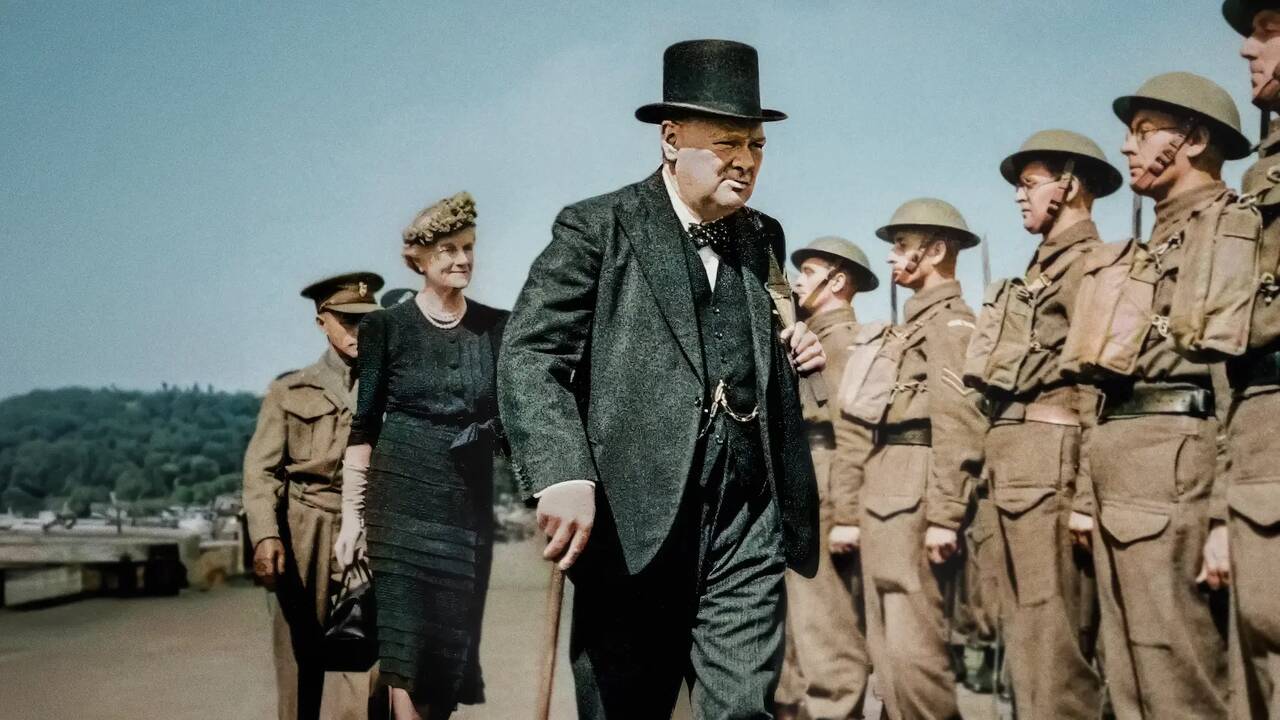
Netflix’s Churchill at War paints a cinematic portrait of Winston Churchill’s wartime leadership in a sleek four-episode format. Blending colorized archival footage, reenactments, and Churchill’s own speeches, the series immerses viewers in the era’s high-stakes drama. Produced by Ron Howard and Brian Grazer, this docuseries promises an in-depth exploration of Churchill’s role as both a leader and a flawed human being. However, like its subject, the series is not without its contradictions.
The show’s greatest strength lies in its storytelling and production quality. The restored visuals are stunning, with colorized footage and crisp cinematography that breathes life into a period often seen only in black and white. This vibrant aesthetic, combined with soundscapes of bombings, political debates, and Churchill’s voiceovers, pulls viewers into the emotional tension of wartime Britain. Churchill’s speeches, delivered in his booming baritone, serve as the narrative backbone, reminding audiences of his rhetorical genius and the power of words in shaping history.
Equally impressive is the pacing of the series. Each episode focuses on a key wartime challenge—strategic decisions, political rivalries, and Churchill’s relentless determination to keep Britain afloat against overwhelming odds. The brevity of the four-hour runtime ensures that the series avoids becoming an exhaustive history lesson. Instead, it offers an accessible entry point into Churchill’s life, making it engaging for casual viewers and history buffs alike.
Yet, for all its strengths, Churchill at War falters in its portrayal of its titular character. While the series attempts to humanize Churchill by showcasing his vulnerabilities—his moments of doubt, his controversial policies, and his personal sacrifices—it often stops short of meaningful critique. For instance, his decisions regarding colonial territories and their long-lasting impacts are only briefly touched upon, leaving a sanitized version of his legacy. Similarly, his fraught relationships with colleagues and his struggles with mental health are presented as footnotes rather than integral elements of his story.
The reenactments, while visually striking, are another mixed bag. They succeed in dramatizing Churchill’s confrontations and behind-the-scenes moments but occasionally feel overly polished. The actors deliver their lines with the weight of theatrical performances, which, while compelling, sometimes detracts from the documentary’s authenticity. These dramatizations are further undermined by their tendency to simplify complex situations, making the series feel more like a wartime drama than a nuanced historical analysis.
Another critique lies in the episodic structure. While the decision to focus each episode on distinct wartime themes is logical, it leads to a predictable rhythm. By the final episode, the structure feels repetitive, diminishing the climactic impact of Churchill’s ultimate victory. Additionally, the series, despite its focus on Churchill, misses an opportunity to highlight the contributions of other wartime leaders and citizens who were instrumental in Britain’s survival. The result is a narrative that feels a little too insular, as though Churchill alone carried the weight of the war effort.
Despite these flaws, the series delivers in its moments of emotional resonance. Churchill’s speeches, juxtaposed with images of war-torn Britain, create a poignant juxtaposition of hope and despair. The scenes of ordinary citizens enduring the Blitz, interspersed with Churchill’s tireless advocacy for resistance, remind viewers of the human cost of leadership and war. These moments, while fleeting, elevate the series beyond a mere biographical account into something more profound.
One of the series’ most intriguing aspects is its exploration of legacy. By framing Churchill’s decisions through the lens of hindsight, it raises questions about how history remembers its heroes. While the series ultimately leans toward admiration, it doesn’t shy away from showing Churchill’s missteps and their consequences. This balance—though not always consistent—adds depth to the narrative and prompts viewers to reflect on the complexities of leadership.
In conclusion, Churchill at War is a compelling but uneven portrayal of a man whose life defies simple categorization. Its visual and auditory splendor, combined with its tight pacing, makes it an enjoyable watch. However, its reluctance to fully confront Churchill’s darker aspects limits its impact as a definitive historical analysis. For those seeking an introduction to Churchill’s wartime legacy, it serves as an engaging primer. However, for viewers craving deeper insights, the series leaves much to be desired.
Ultimately, Churchill at War mirrors its subject: inspiring, flawed, and undeniably fascinating. It may not reinvent the historical documentary genre, but it reminds us why Churchill remains an enduring figure in history. At its best, it captures the tension of wartime Britain; at its weakest, it succumbs to the weight of its own mythology. Nevertheless, it’s worth watching—not for what it says about Churchill, but for what it reveals about the narratives we choose to remember.
Final Score- [5/10]
Reviewed by - Anjali Sharma
Follow @AnjaliS54769166 on Twitter
Publisher at Midgard Times
Hi Everyone, after a due consideration, we have decided that we will be open for donations to help us in managing our website. We will be greatful for any kind of amount we receive. Thanks!
— Midgard Times 🎬 (@Moviesr_net) January 4, 2026
PayPal- [email protected] pic.twitter.com/DlNNz5Npm5
Get all latest content delivered to your email a few times a month.
Bringing Pop Culture News from Every Realm, Get All the Latest Movie, TV News, Reviews & Trailers
Got Any questions? Drop an email to [email protected]